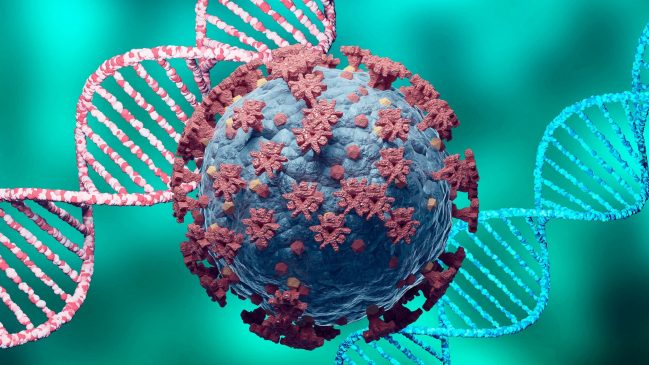A Covid-negative report after a bout of the infection might seem like a moment to celebrate, but for many, it’s just the beginning of another ordeal. Two months after Aabha Malik tested negative, her life and work continue to be affected. “I put my pen down and two minutes later forget where I kept it. When others are speaking, I find it difficult to focus on the words. It feels like my brain is stuck,” says the 28-year-old IT research intern in Bengaluru. While her colleagues jokingly call her “noodle brain”, her doctor says she is suffering from mental fogginess—a condition often associated with cancer patients undertaking chemotherapy (commonly called chemobrain), where key cognitive functions such as attention and memory, besides emotions and sleep, get impacted.
Read More : IRCTC Update: Indian Railways Cancels Over 150 Trains Today. Check List Here
“When the pandemic began,” says Dr M.V. Padma Srivastava, head of neurology and chief of the neurosciences centre at AIIMS, Delhi, “we assumed the symptoms would be primarily in the lungs. But now it is quite clear that the virus can affect almost any organ, including the brain. In India, we have seen a number of patients with brain fog.” According to a study published in the October 2021 issue of the journal JAMA Network Open, nearly one in four people who have had Covid suffer from problems in memory recall and memory encoding, while many also have symptoms of impaired processing speed and verbal fluency. “The condition might be short-term but it can damage quality of life,” says Dr Srivastava. A study of 100,000 people by scientists at the University of Oxford and published in Nature in March 2022 showed that Covid patients—four and a half months after testing positive—had lost 0.2-2 per cent more grey matter than those who had not been infected. This was the first large study that had pre-Covid data to rely on and was able to prove what others had been merely hypothesising about since the pandemic began—the virus indeed causes brain damage and worsens pre-existing neurological problems.

In those who have had moderate to severe Covid, the brain can get impaired in a way equivalent to ageing 20 years, concludes an April 2022 study by NIHR Cambridge Biomedical Research Centre published in eClinicalMedicine. Looking at around 66,000 patients, the study shows the magnitude of cognitive loss is similar to losing 10 IQ points. Moreover, an April 2021 study published in JAMA finds that those who had Covid run double the risk of suffering strokes compared to others of the same age, sex and ethnicity. “Internal inflammation caused by Covid can cause blood clots that are as harmful for the brain as for any other organ,” says Dr Srivastava. “Even a minor heart palpitation should not be ignored. The heart and the brain are closely linked and signs of trouble in one could indicate trouble in the other.”

Dr Srivastava says a rush to “return to normality” and lack of awareness and preventive check-ups during recovery can worsen brain health. “There is no guarantee about what could go wrong. One should monitor health and follow medical advice,” she adds. Most doctors agree that the possibility of brain problems does not mean something will go wrong. “Panic doesn’t solve anything. The added stress can actually worsen your condition,” says Dr P.N. Renjen, a senior neurologist at Apollo Hospitals, Delhi. “Understanding the risks and mitigating them safeguards and improves brain health.” Unlike two years ago, there are fairly substantive insights now into how Covid affects the brain. That’s the first step towards prevention.
Read More : Here’s How PF (Provident Fund) Members Can Generate UAN (Universal Number) Online
Does Covid infect the brain?
If there is still some scepticism around whether Covid-induced brain fog is real or just an internet label, it is partly due to doubts about the first study that established the term ‘long Covid’—a May 2020 online survey by queer feminist wellness collective Body Politic. It was later found that a quarter of the respondents claiming to have persistent symptoms had not tested positive for Covid, and half had never been tested. There have been more reliable studies since then, involving only Covid-positive respondents and published in peer-reviewed journals.
In the early days of the pandemic, some speculated that the virus might be entering the brain and infecting neurons, the cells responsible for cognitive processing. But recent studies show that the blood-brain barrier is the furthest the virus gets—it doesn’t directly attack neurons. A July 2022 study by the National Institutes of Health in the US found no evidence of the virus directly entering the brain. “Inflammation, reduction of blood flow or a clot travelling to the brain through blood are more commonly seen as reasons for neurological damage,” says Dr Jyoti Sehgal, associate director, neurology, at the Institute of Neurosciences, Medanta The Medicity, Gurugram. A study of people who died due to Covid, published in January 2022 by University of California neurologists, found that in 66 per cent of the cases, the virus had affected brain cells known as astrocytes. This could be the reason for symptoms such as fatigue, depression and brain fog. Evidence from University College London has now suggested a second way in which Covid affects the brain—by blocking blood flow to the organ. This happens when receptors called pericytes are damaged, causing tissues to constrict. Reduced blood flow can impair the functioning of neurons and even kill them.
Damage to the bloodbrain barrier can cause bleeding and clots in patients, increasing the risk of stroke”
Damage to the bloodbrain barrier can cause bleeding and clots in patients, increasing the risk of stroke”- Dr Jyoti Sehgal, Associate Director, Neurology, Institute of Neurosciences, Medanta – The Medicity, Gurugram
Evidence has also emerged for a third path through which Covid can impact the brain. Research by the US-based National Institute of Neurological Disorders and Stroke shows that inflammation results in the immune system attacking and even damaging brain cells. Antibodies—proteins produced by the immune system in response to Covid—have been shown to damage the cells forming the blood-brain barrier. “Damage to this barrier can cause bleeding and clots in patients, increasing the risk of stroke,” says Dr Sehgal. “Diagnosing how Covid has affected your body and brain will determine the kind of treatment. If one finds clots or reduction in blood flow, then the condition is more serious than when you have symptoms of brain fog with no physical damage to the organ.”
How to stay safe
Vaccination helps reduce the chances of brain fog. A self-reported study of 1.2 million UK citizens in November 2021 found that two doses halved the risk of long-Covid symptoms. Analysing eight studies published before mid-January 2022, the UK’s Health Security Agency found that six of them showed vaccines reduced post-Covid complications. “It is added protection and limits inflammation, which in turn reduces lasting complications,” says Dr Sehgal.
Many doctors advise even those who are vaccinated to get basic blood tests done during their illness as vaccine immunity wanes and those who are elderly or have comorbidities can still be at risk of neurological complications. “I suggest four tests—Interleukin 6 or IL-6, D-dimer, complete blood count and C-reactive protein,” says Dr Srivastava. These can help doctors ascertain the need for further tests. “I have observed in my patients that monitoring IL-6 (a chemical associated with inflammation) can reduce chances of post-Covid brain problems,” says Dr Renjen. A June 2022 study of 8,077 people published in PubMed by German researchers found elevated levels of IL-6 in those with severe long-Covid symptoms. “We need more research on whether continued IL-6 increase leads to brain fog, depression and other brain impairments, but it is a helpful parameter to monitor when you have Covid,” adds Dr Renjen.
Read More : Ways to Earn Genuine Respect Without Trying too Hard
According to Dr Sehgal, clinical diagnosis of post-Covid health is vital. Depending on symptoms and blood biomarkers, doctors might advise brain imaging, or even a cerebrospinal fluid test, where a needle is inserted to check for abnormalities in brain fluid. “Whether your problems are minor or indicate something major is decided by many factors—age, family history, health status, type of Covid, care during and after infection, and the symptoms,” adds Dr Sehgal.
Signs of stroke or worsening of pre-existing neurological diseases such as Alzheimer’s or Parkinson’s are treated differently from brain fog. “Brain fog can be treated with psychosocial interventions and lifestyle changes, but more serious conditions need medication,” says Dr Pawan Ojha, a senior neurologist at Hiranandani Hospital in Vashi, Mumbai.

To cure brain fog, research and medical opinion point to rest, nutrition and mental health support. “Sleeping eight to 10 hours in the night is essential for recovery,” says Dr Ojha. Brain fog, however, severely disturbs the quality and length of sleep, found a 2021 PubMed study of 500 patients. To counter this, doctors stress the importance of setting a daily routine. “Your body clock gets adjusted to sleeping and waking up at a particular time, and one should not disturb it,” says Dr Sehgal. If one has trouble falling asleep, the UK’s National Health Service recommends a wind-down routine—eating three hours before bed, turning off screens an hour before sleep, writing down worries, and practising mindfulness or meditation. Harsh Chauhan (name changed), a 39-year-old management consultant, found that doing puzzles helped him fall asleep post-Covid, and sleep reduced his anxiety and brain fog. “I rested my way to recovery from brain fog. It is a cycle—you feel unhappy and can’t sleep, and because you can’t sleep, you can’t feel happy,” he says. He also slowly returned to exercising.
Doctors say patients often confuse movement with exercise. Light movement can play a role in mitigating stress, perception of pain and modulation of brain functions by releasing endorphins. “Movement is important but not heavy exercise,” says Dr Srivastava. “People with long-Covid symptoms should rest for three months before returning to the gym so that the body gets time to heal.” A study published in May 2021 in the Journal of Chronic Respiratory Disease concluded that those who went through a supervised rehabilitation period showed better improvement in cognitive function than those who did not. The Johns Hopkins University’s detailed guide for post-Covid rehabilitation recommends five pillars—breathing, movement of head and eyes, cross-body patterns such as walking, strength training and endurance. In the first few weeks post-Covid, it recommends no more than five minutes of cardio, gradually building up to 30 minutes after the first two months.
The brain also needs essential nutrients during recovery. Doctors recommend a diet rich in vitamin B12, vitamin E and antioxidants. Consuming nuts, dairy products and fish, which are rich in serotonin, can help overcome weakness, repair cells and improve mood. “If your symptoms indicate mild brain fog and tests confirm it, then I usually start by recommending lifestyle changes, including better nutrition and proper rest,” says Dr Renjen.
Doctors also suggest some attention to mental health. “This does not necessarily mean you have to go for therapy or take medicines,” says Dr Sandeep Vohra, psychiatrist and founder of the Vohra Neuro Psychiatry Centre in Delhi. Having treated many patients suffering from post-Covid anxiety or depression, Dr Vohra says sometimes the conditions were pre-existing and the illness aggravated them. “They can also be caused by the illness if there is a high level of inflammation and environmental stress,” he says. The first step of treatment, he says, begins at home. “Start by speaking to close friends and family or writing your problems down. But if that does not work, then seek a doctor’s consultation where you can draw up a personalised plan for treatment. Everything does not work for everyone,” he adds.
The first step of treatment begins at home… If it does not work, then seek a doctor’s consultation to draw up a personalised treatment plan”
“The first step of treatment begins at home… If it does not work, then seek a doctor’s consultation to draw up a personalised treatment plan”- Dr Sandeep Vohra Psychiatrist and founder, Vohra Neuro Psychiatry Centre, Delhi
Some have found that music, art, learning a new language, reading or gardening helped them recover their cognitive health. For Chennai-based homemaker Ananya Nanda, 63, stress-busting came in the form of embroidery classes. “Taking online lessons and working with the needle helped improve my mental health and focus tremendously. Until then, I wasn’t even able to remember something I had learnt just an hour ago,” she says.
Difficulty in thinking and working the way you used to can be hard to handle. But not doing anything about your symptoms, or treating yourself without medical diagnosis, could make it worse. Instead of living with the fear that your brain is not working properly, doctors say it is best to come in for a consultation. “For every patient who comes in for diagnosis on time, there are many who don’t,” says Dr Sehgal. “Internet-based self-medication is harmful because Covid has a complicated relationship with the brain. One should consult a doctor before starting diets, exercises or medication.” The choice is ultimately yours





































